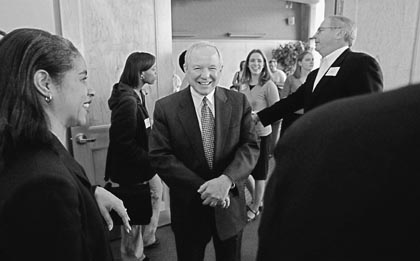By Philip Eaton,
President
![]()

SPU Commits to Welcoming and Serving People of All Races and Ethnic Groups

"I have a strong and growing conviction I want to share as clearly as I can: We intend to open wide the doors at Seattle Pacific University so that more ethnic minority students, faculty and staff may walk onto our campus and flourish. We will tackle this challenge with new boldness, honesty, enthusiasm and determination.
While we have some strong momentum in this area, we are setting clear goals for the future. We will increase ethnic minority enrollment to 12 percent. We will continue to add new ethnic minority faculty and staff. We will build better bridges across our city, hoping to find guidance, wisdom and friendship from within the ethnic community, especially from ethnic churches. Our new Ames Initiative provides financial assistance to bring students to campus, seeking most importantly to mentor and encourage these students as they seek to become graduates of competence and character.
Why should we make these efforts? I am convinced that a primary task for Christians in the 21st century is to dismantle walls that divide – to understand and affirm differences, to be sure, but also to learn better how to negotiate the boundaries that separate. Our world is divided in powerful, profound and sometimes violent ways. As a leading Christian university, we must do everything possible to counter these forces of dividedness. This is the larger purpose for our initiative.
For 30 years, says writer and English professor Kenneth Bruffee, multicultural education has set out to acknowledge the existence of boundaries between cultural communities. Some of this work has been very helpful, perhaps essential. Most certainly, differences need to be discovered, explored and affirmed. That is part of our task for this initiative.
But we have gained at best only "institutionalized tolerance" of differences from the multicultural movement, and tolerance is not enough. "Living as we do in a heterogeneous nation and world," says Bruffee, "it seems about time, without sacrificing what genuinely distinguishes us from one another, to learn to recognize and affirm our genuine commonality. ... To do so requires rethinking multiculturalism." We need new vision and leadership about how to come together across the boundaries that divide. We need a new and compelling model for genuine community.
Bruffee makes reference to a poem I have loved over time, Robert Frost's "Mending Wall." "Something there is that doesn't love a wall," says Frost's narrator. And yet, counters the neighbor, "good fences make good neighbors." There is a tension here.
Of course we build walls, and at times we need walls. We need to feel safe and affirmed within the boundaries of our own cultural, national, racial and even religious identities. We need to understand how we are distinctive, what special gifts we bring to the mix.
But, Frost's narrator goes on to ask, "Why do [good fences] make good neighbors?/ ... Before I built a wall I'd ask to know/ what I was walling in or walling out,/ And to whom I was like to give offense." Indeed, he repeats, "Something there is that doesn't love a wall,/ That wants it down."
I think we live at an extraordinary historical moment where walls must come down. It is our task to locate, articulate and live within that "something" that wants to tear down walls. We need to gather around that "something" that heals and draws us together for a common purpose.
That "something" for us at Seattle Pacific University lies at the very foundation of our view of human dignity and human community. We encounter first the great scriptural assertion that all are created in the image of God. We move on from there to understand that in Jesus Christ "there is no longer Jew or Greek, there is no longer slave or free, there is no longer male and female; for all of you are one in Christ Jesus."
But even this is not enough, because we are nothing without the love that pulls us together. "Make love your aim," says Paul. "Agree among yourselves, and avoid divisions; let there be complete unity of mind and thought."
Our vision to engage the culture and change the world requires of us fresh efforts to say "welcome" to all of God's children. I believe that God calls us to tear down walls, to find common ground, our common humanity, and to build up a Christian community that welcomes, nurtures and encourages all people. This is not an easy task, nor is it the only task at SPU. But we intend to stay the course. I ask for your patience and your encouragement as we take these new steps forward.
![]()

| Please
read our
disclaimer.
Send any questions, comments or correspondence about Response to
jgilnett@spu.edu or call 206-281-2051. Copyright © 2003 University Communications, Seattle Pacific University.
Seattle Pacific University |